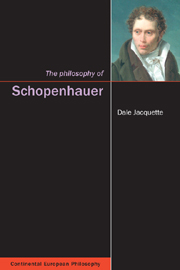Book contents
- Frontmatter
- Contents
- Dedication
- Preface
- Acknowledgements
- A note on texts and terminology
- Abbreviations
- Introduction: Schopenhauer's life and times
- 1 Schopenhauer's idealism
- 2 Empirical knowledge of the world as representation: from natural science to transcendental metaphysics
- 3 Willing and the world as Will
- 4 Suffering, salvation, death, and renunciation of the will to life
- 5 Art and aesthetics of the beautiful and sublime
- 6 Transcendental freedom of Will
- 7 Compassion as the philosophical foundation of morality
- 8 Schopenhauer's legacy in the philosophy of Nietzsche, Heidegger and the early Wittgenstein
- Notes
- Bibliography and recommended reading
- Index
6 - Transcendental freedom of Will
- Frontmatter
- Contents
- Dedication
- Preface
- Acknowledgements
- A note on texts and terminology
- Abbreviations
- Introduction: Schopenhauer's life and times
- 1 Schopenhauer's idealism
- 2 Empirical knowledge of the world as representation: from natural science to transcendental metaphysics
- 3 Willing and the world as Will
- 4 Suffering, salvation, death, and renunciation of the will to life
- 5 Art and aesthetics of the beautiful and sublime
- 6 Transcendental freedom of Will
- 7 Compassion as the philosophical foundation of morality
- 8 Schopenhauer's legacy in the philosophy of Nietzsche, Heidegger and the early Wittgenstein
- Notes
- Bibliography and recommended reading
- Index
Summary
As the will itself is not phenomenon, not representation or object, but thing-in-itself, it is also not subordinate to the principle of sufficient reason, the form of all object. Thus it is not determined as consequent by a reason or concept or ground, and so it knows no necessity; in other words, it is free. The concept of freedom is therefore really a negative one, since its content is merely the denial of necessity, in other words, the denial of the relation of consequent to its ground according to the principle of sufficient reason … Everything as phenomenon, as object, is absolutely necessary; in itself it is will, and this is perfectly free to all eternity.
(WWR 1: 287)World and individual
The individual thinking subject, like the world as a whole, has both an inner and outer aspect. There is a parallelism in Schopenhauer's philosophy between, on the grand scale, the world as representation and thing-in-itself as Will, and, on the personal scale, the individual's body and phenomenal will to life. The will to life also has a dual nature. It consists primarily of psychological episodes occurring in real space and time, as an overlay on a transcendent core of unmotivated, uncaused, objectless and hence subject-less, unindividuated and inexplicable pure willing. Pure willing is identical in each willing subject with Will as the one and only thing-in-itself, that, unlike the body and mind, is indestructible and immortal.
- Type
- Chapter
- Information
- The Philosophy of Schopenhauer , pp. 180 - 202Publisher: Acumen PublishingPrint publication year: 2005

